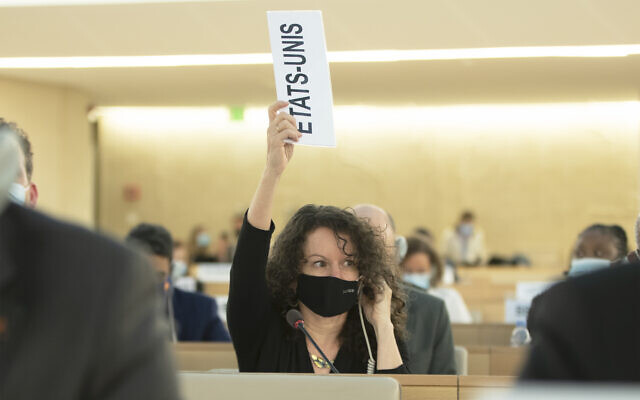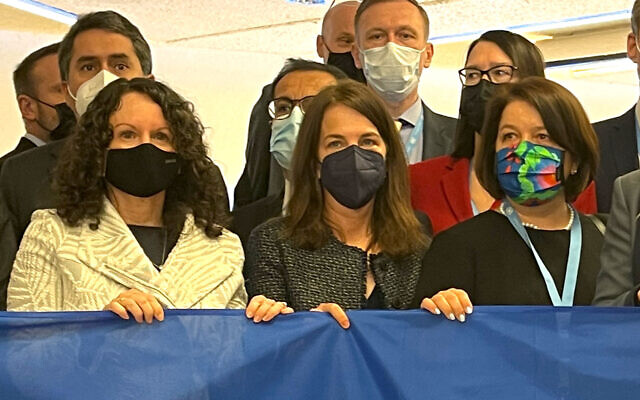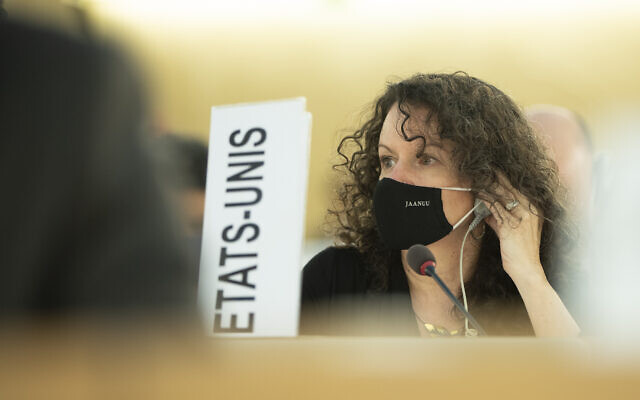Exclusive: Taylor’s First Interview as U.S. Ambassador
U.S. ambassador confronts “unfair bias against Israel in the structure” of the U.N. Human Rights Council.
Dave Schechter is a veteran journalist whose career includes writing and producing reports from Israel and elsewhere in the Middle East.
Within days of taking up her post as the U.S. Permanent Representative to the United Nations Human Rights Council, Ambassador Michèle Taylor joined a walkout when Russia’s foreign minister defended his nation’s invasion of Ukraine.
Not two weeks earlier, on Feb. 17, the Jewish Atlantan nominated by President Joe Biden was confirmed by the U.S. Senate on a voice vote. Five days later, Taylor was sworn in at the State Department, in a small office with a notary present and her family watching on a video call.
After picking up “my still drying visa from the Swiss embassy on the way to the airport,” Taylor flew to Geneva, Switzerland, where the Human Rights Council is based, on Feb. 24, the day of Russia’s invasion. On arrival, “I dropped off my bags, went to the Mission [the U.S. diplomatic headquarters], and we held a meeting with several like-minded countries to begin conversations about how we address this,” Taylor told the AJT, in her first interview since taking up the post.
The past several weeks have been a whirlwind for the 55-year-old. When the 49th session of the Human Rights Council concluded at the end of March, Taylor — who left Atlanta carrying “a bag with clothes and a few toiletries” — returned for the Passover holiday and packed for an extended residence in Geneva.

Taylor’s nomination followed Biden directing the State Department to re-engage with the Human Rights Council, reversing the June 2018 withdrawal ordered by then-President Donald Trump. The Council’s 47 member nations are elected by the 193-nation U.N. General Assembly. Because seating in the UNHRC chamber is by alphabetical order in French, the United States (États Unis) delegation sits between Eritrea (Érythrée) and the Russian Federation (Fédération Russe).
“So far overall, very positive,” was Taylor’s assessment of her first weeks on the job. “I am really impressed by the level of engagement in Geneva, around human rights issues in general and particularly around the HRC.”
One surprise, Taylor said, has been “the deep level of engagement that Israel has with the HRC.”
Israeli government officials and diplomats, as well as prominent Jewish groups in the United States, frequently express irritation with what they regard as the anti-Israel attitude of the U.N. in general and the Human Rights Council, in particular. Israel’s Permanent Representative to the United Nations and International Organizations in Geneva, Ambassador Meirav Eilon Shahar, recently called the Council an “echo chamber of fantasy and hatred against Israel.”

While not a member of the HRC, Israel has observer status and participates in debates. Israel also is a member of the Western European and Others Group (WEOG), one of five U.N. regional groups, which meets in Geneva.
Israel is the only nation subject to a permanent place on the Human Rights Council agenda, known as Item #7: “Human rights situation in Palestine and other occupied Arab territories.”
The HRC maintains an open-ended investigation (sanctioned in 2007) of Israel’s treatment of Palestinian Arabs and in May 2021 formed a Commission of Inquiry following the war in which Palestinian militants fired 4,300 rockets at Israel, which responded with airstrikes at targets in Gaza. Israel has complained that the people placed in charge of the investigation and the commission of inquiry have histories that demonstrate anti-Israel bias.
In its recent session, the Human Rights Council overwhelmingly backed four resolutions addressing Israel: “Human rights situation in occupied Palestinian territory, including East Jerusalem, and the obligation to assure accountability and justice,” “Rights of Palestinian people to self-determination,” “Israeli settlements in the Occupied Palestinian Territory, including East Jerusalem, and in the occupied Syrian Golan,” and “Human rights in the occupied Syrian Golan.” By comparison, two resolutions cited South Sudan and one each addressed issues in Russia, Nicaragua, North Korean, Myanmar, Iran, Belarus and Syria.
“There is no question. There is an unfair bias against Israel in the structure of the HRC,” Taylor said. “The United States feels strongly that no country should be treated differently than any other country in the way it is scrutinized.”
The U.S. was among a handful of nations that voted against the resolutions citing Israel. In one case, “I personally called for that vote,” Taylor said. “If nobody calls a vote, a resolution passes by consensus. We would never want any resolution under item #7 to pass by consensus.”
When she addressed the chamber on April 1, Taylor said: “The United States strongly and unequivocally opposes the Human Rights Council’s biased Agenda Item 7. The continued existence of this agenda item calls into question the credibility of this body. None of the world’s worst human rights violators, some of whom are the subject of resolutions at this session, have their own stand-alone agenda item at this Council. Only Israel receives such treatment. For these reasons, the United States must oppose the annual group of resolutions under Agenda Item 7, which are biased against Israel. Further, we strongly reject the characterization voiced by some that Israel’s actions constitute apartheid.
“One-sided resolutions distract from efforts to advance peace. The United States is committed to a negotiated two-state solution and believes that Israelis and Palestinians alike deserve to live safely and securely and enjoy equal measures of security, freedom, and prosperity. The United States will continue to oppose every effort to delegitimize Israel. For these reasons, we call a vote on this Item 7 resolution, and we urge our fellow Members to join us in voting ‘no.’”
In addition to Israel, Taylor cited the Mission’s role in the recent session on issues related to South Sudan and Belarus as other examples of why she thinks it critical that the U.S. maintain full member status. “When we’re not there, there is a void and that void is filled in ways that we would not want see happen,” she said, adding that there are “others who would like to see human rights redefined as it applies to other communities and we lost the ability in the time we were gone to be an active voice.”
In her short tenure, Taylor has observed that “there is a lot of opportunity to engage with like-minded countries and our typical partners on lots of issues, but also opportunities to work with countries that maybe we don’t have 100 percent overlap with or even a great amount of overlap with, but we can still find areas in which we agree.”
“My personal bent is to engage whenever possible,” Taylor said, though “I’ll be thoughtful about what that looks like,” whether that takes the form of one-on-one meetings or in groups and other forums. “But I will engage with every country that’s engaged, in whatever way is appropriate based on our relationship. I think that it is notable that the president knows me well and chose to send me into this place.”
The March 1 walkout during Russian Foreign Minister Sergei Lavrov’s speech followed a plan that called for the Ukrainian ambassador to rise first and then be followed by other nations. “The pleasant surprise for all of us was the level of participation. There were far more people who got up and walked out than anyone would have expected,” Taylor said.
The Human Rights Council on March 3 established a commission of inquiry to examine human rights violations in Ukraine by the Russian military, but also in Russia, where anti-war protestors have been targeted by authorities. “Part of the mandate is to collect evidence that can be used in the future, so that none of this evidence is lost,” Taylor said. The General Assembly, meeting in New York, on April 7 removed Russia from the Council.
Though Taylor has yet to meet all of her diplomatic counterparts, she said her first formal meeting was with Israeli Ambassador Eilon Shahar. Taylor was pleased to discover that “There are a large number of women ambassadors in Geneva, and we have really had a great opportunity to meet one another, to communicate with one another. It’s a nice thing to be brought into that sisterhood.”
The first U.S. representative to the U.N. Commission on Human Rights, a precursor of today’s Human Rights Council, was Eleanor Roosevelt, who served from 1947-53. Atlanta attorney Morris Abram, who was Jewish, served in that role from 1965-68.
The UNHRC regular sessions are held in March, June and September, but special sessions can be held at any time. The next session, the Council’s 50th, is scheduled to run from June 13 to July 8.
Taylor will return to Geneva in early May. Her husband, cardiologist Dr. Kenneth Taylor, will join her and periodically return to Atlanta to care for his patients.
- News
- World
- Dave Schechter
- United Nations
- Human Rights Council
- ambassador
- President Joe Biden
- State Department
- Geneva
- Switzerland
- UNHRC
- Donald Trump
- Meirav Eilon Shahar
- Western European and Others Group
- Israel
- Commission of Inquiry
- Palestine
- Gaza
- Jerusalem
- Russian Foreign Minister Sergei Lavrov
- Morris Abram
- General Assembly
- Antisemitism
- Israeli Ambassador Eilon Shahar
- Michele Taylor
- Atlanta
- jewish atlanta




comments